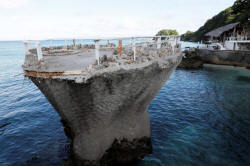|
A masterplan to redevelop Boracay, which has
turned into a "cesspool" due to pollution according to President
Rodrigo Duterte, into a liveable and greener community will be
finalised after its rehabilitation, Tourism Secretary Wanda Teo
said.
"I think we can do it (cleanup) in four months. That's why we
wanted it (to be) total closure, for us to do it fast," she said
in an interview with ANC news channel.
Boracay, which will be closed to local and foreign tourists from
April 26, has joined other beach resorts across Southeast Asia
facing growing pressure due to a surge in visitors.
The government wants to save the tiny island that generated 56
billion pesos, or over $1 billion, last year but cannot cope
under the strain of two million tourists a year.
When it is reopened, Teo said the number of visitors to Boracay,
which a decade ago was found to be capable of accommodating only
about 25,000, will be limited. The number of people on the
island now tops as high as 75,000, she said.
The environment is undertaking a study to determine the island's
"carrying capacity", she said.
The rehabilitation involves the demolition of more than 900
illegal structures, improvement of waste management, and
expansion of drainage and sewage systems.
Boracay, on the northern tip of the central Panay island, is
home to more than 30,000 people and about 1,800 businesses,
including global hotel chains like Shangri-La and Movenpick, and
locally listed companies Megaworld Corp and Manila Water Co Inc.
Boracay is popular for its sugary white sand and lively night
scene, but some 195 businesses there were found to be
discharging untreated waste water into the sea, resulting in
increased concentration of human faeces along the beaches.
Boracay generates 90 to 115 tonnes of trash a day, of which only
30 tonnes are shipped out regularly to a landfill on a nearby
island, Teo said.
Teo expects foregone revenues from the shutdown to be at "around
7 billion pesos", or even lower if the closure period is
shortened to four months, she said.
(Reporting by Enrico dela Cruz; Editing by Michael Perry)
[© 2017 Thomson Reuters. All rights
reserved.] Copyright 2017 Reuters. All rights reserved. This material may not be published,
broadcast, rewritten or redistributed.
Thompson Reuters is solely responsible for this content.
 |
|




